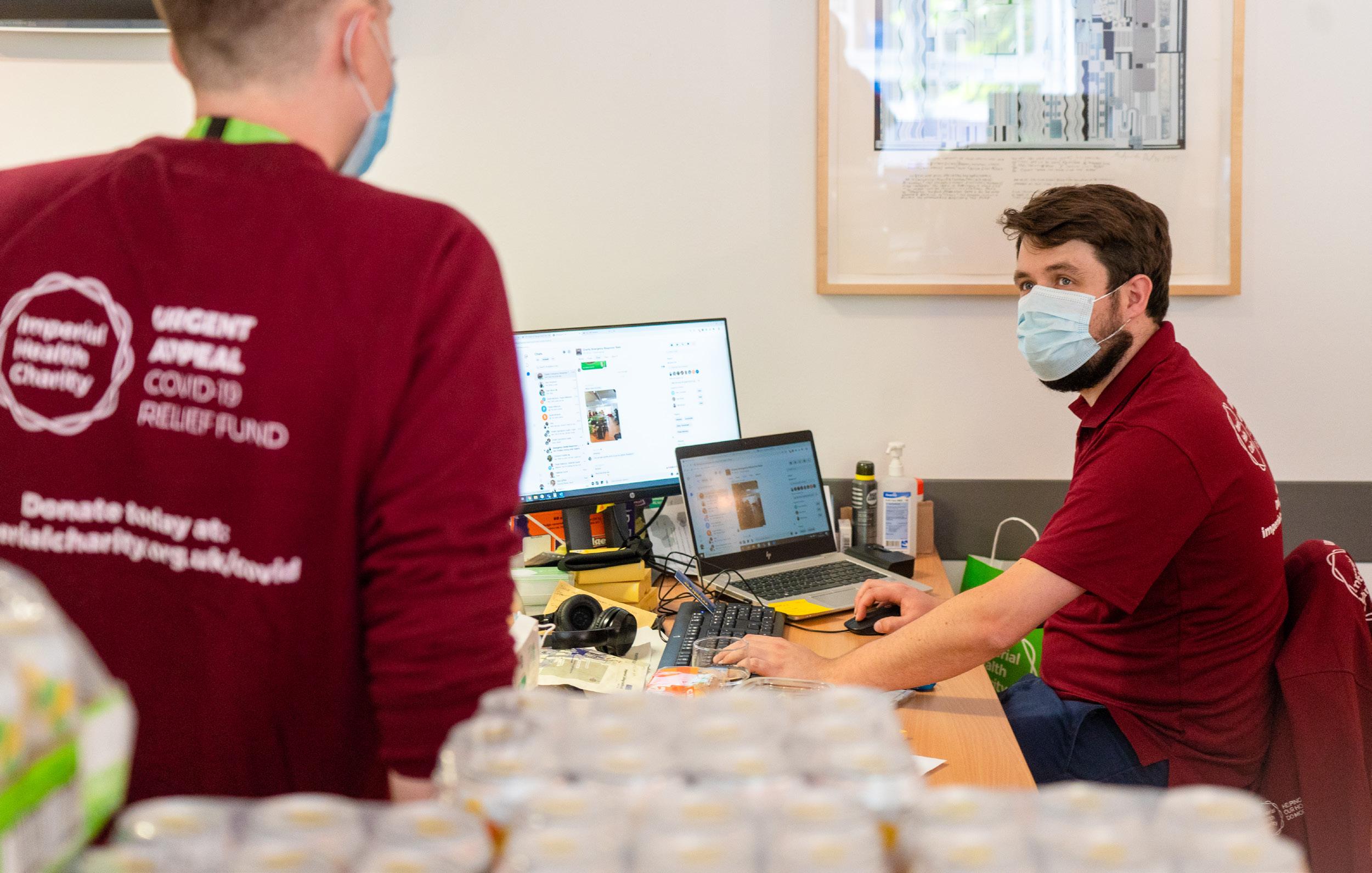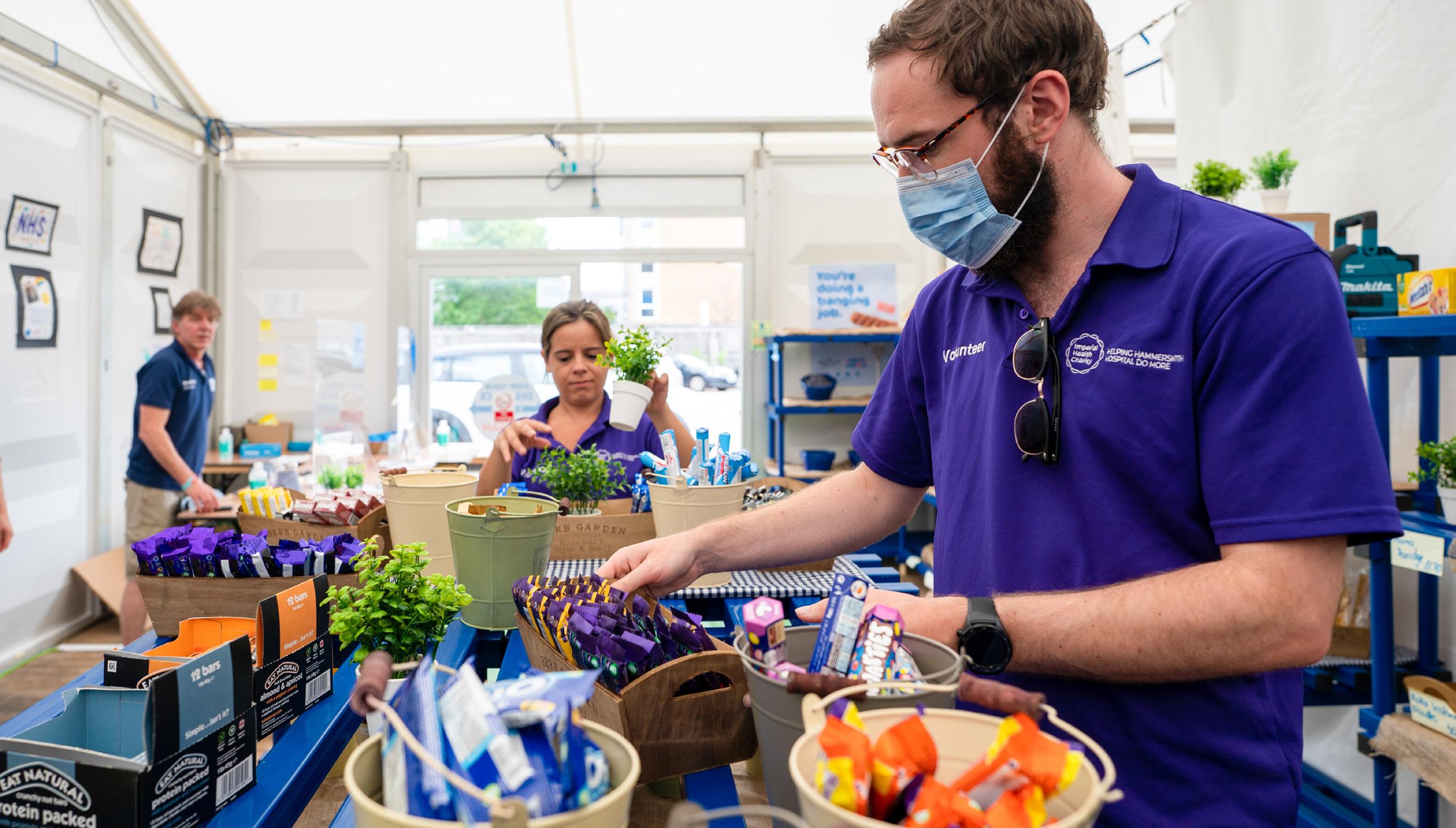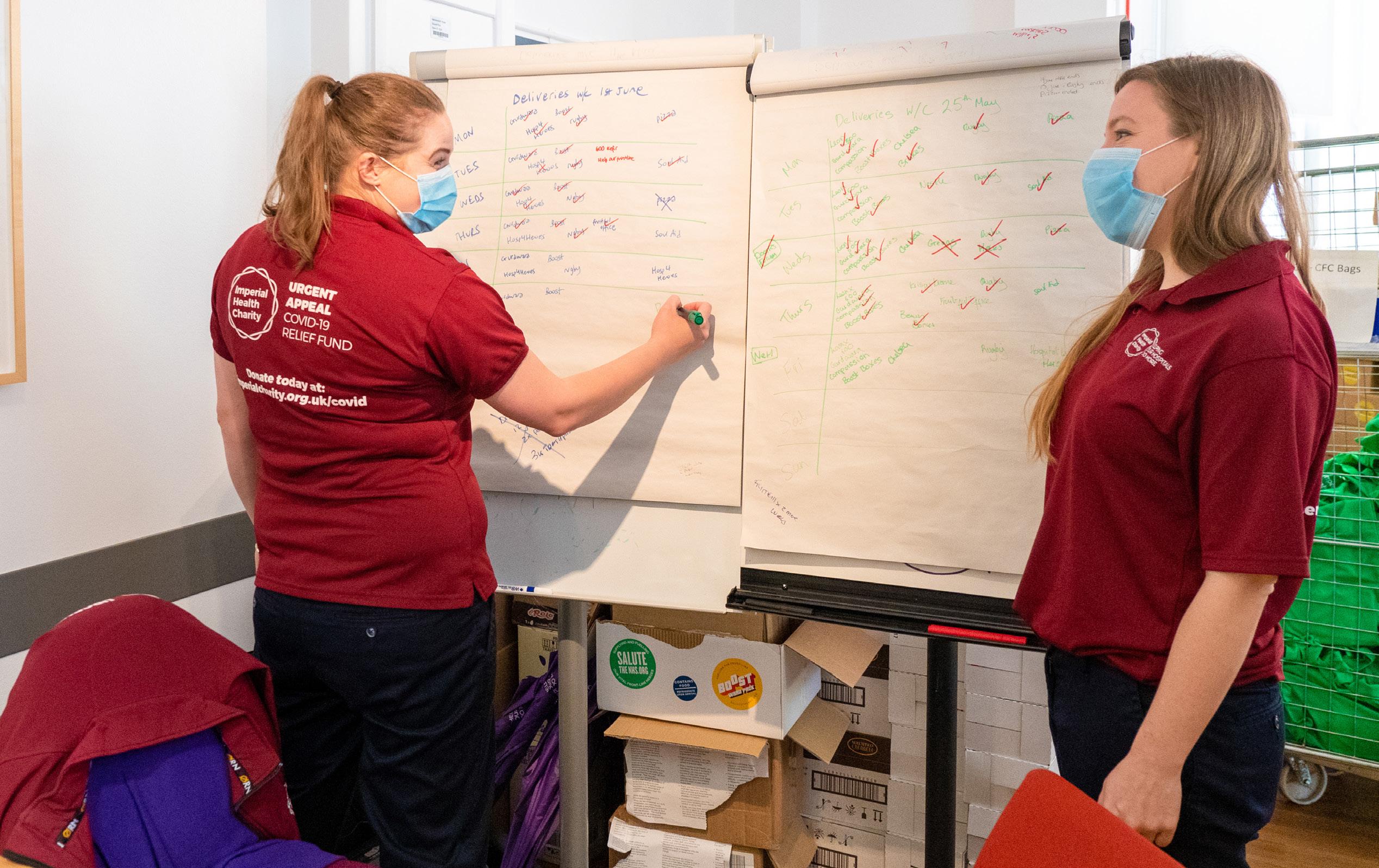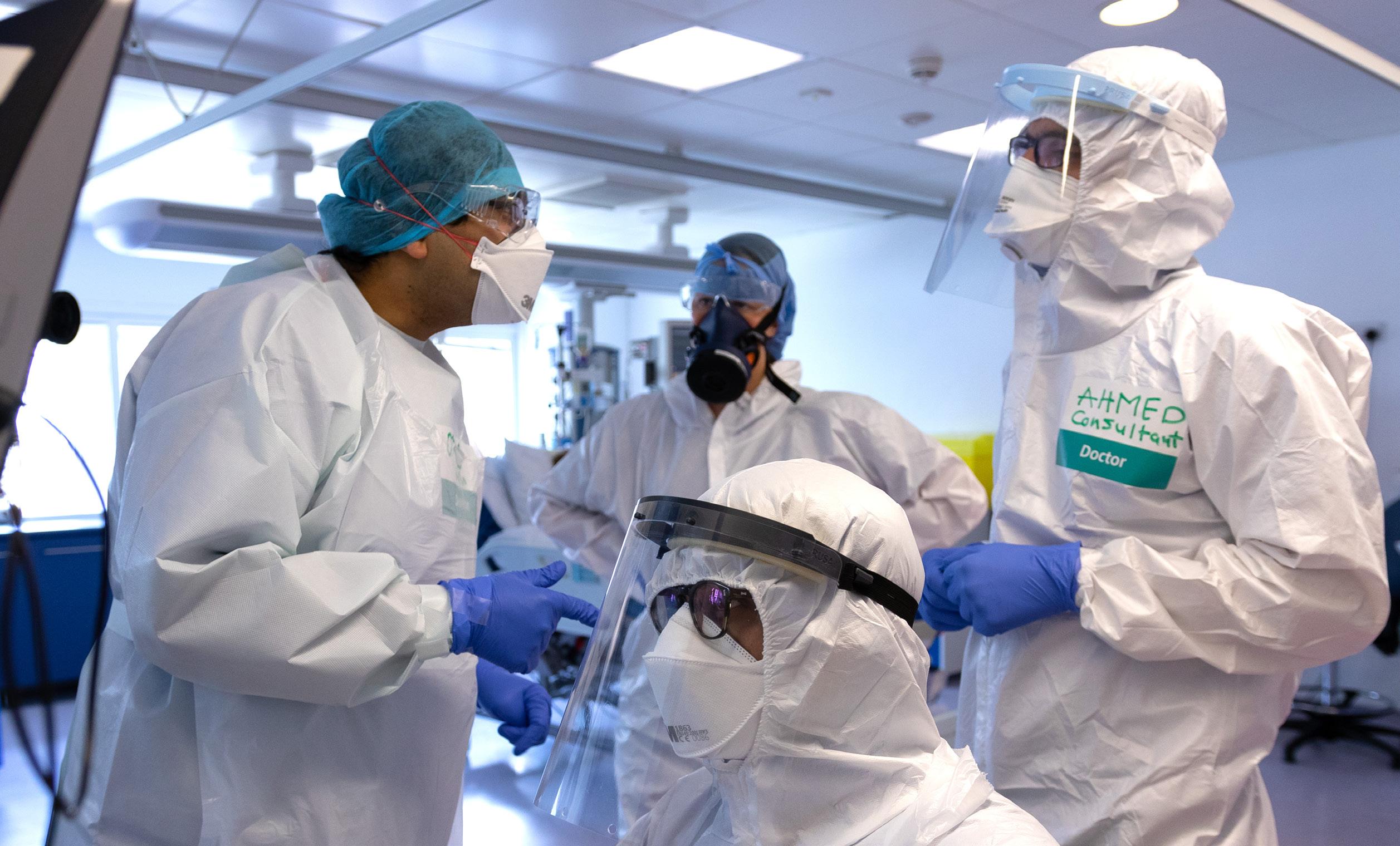
16 minute read
Governance and administration
Good governance is essential to our continued success and enables us to manage our risks appropriately, cultivate a positive working environment and culture for our people, and deliver our charitable activities in compliance with all relevant legislation.
Legal structure
Imperial Health Charity is an independent charity and a charitable company limited by guarantee. It is registered with Companies House and with the Charity Commission for England and Wales. The charity was registered as a UK charity on 1 April 2016 (no. 1166084) and as a Charitable Company on 11 February 2016 (no. 9999900). The charity’s governing document is its Memorandum and Articles of Association.
Charitable purpose and objects
The objects of Imperial Health Charity are restricted specifically to:
• any charitable purpose or purposes relating to the National Health
Service or for the general or specific purposes of the Imperial College
Healthcare NHS Trust; and
• the relief of sickness and preservation of health of people living in the UK for the public benefit. Although we are independent of Imperial College Healthcare NHS Trust, our work focuses on enhancing and improving the quality of patient care beyond that which can be achieved by routine NHS funding and on health initiatives for the wider community.
Our work also includes focusing on opportunities to boost income through fundraising, enabling further support for our charitable activities within and beyond the Trust’s hospitals.
Governance and management
Board of Trustees
Our Board of Trustees is legally responsible for the governance, strategic planning and leadership of the charity. The board currently comprises nine trustees: six independent members and three representing Imperial College Healthcare NHS Trust. Under the Memorandum and Articles of Association, the chair must be one of the independent members.
Trustees are appointed as company directors for a renewable term of three years and can serve no more than three consecutive terms.
Statement of public benefit
We provide public benefit by helping to improve the quality of care and hospital experience for patients at the five hospitals of Imperial College Healthcare NHS Trust and in the wider community of north west London. In reviewing our aims and objectives and planning future activities, our trustees have taken into account the Charity Commission’s general guidance on public benefit and always ensure that our activities are in line with our charitable purpose and objects.
Charity staff played a key role in organising urgent support for NHS staff and patients at Hammersmith Hospital.

Trustees receive no payment for exercising their roles, but reasonable out-of-pocket expenses are paid. Trustees are sole members of the company with a guarantee of £1.
Recruitment, induction and training
Vacancies for independent trustees are advertised in the charity sector and health sector media, on our website and within the Trust’s hospitals. Suitable candidates are interviewed by a selection panel and nominations to serve as representatives of the Trust are put forward for consideration by the board.
A formal induction programme is provided for new trustees, including an information pack containing our governing document, the most recent Annual Report & Accounts, budgets, policies and minutes. All trustees are invited to attend seminars and conferences on topics relevant to their roles during their term of office.
Every two years, each trustee undertakes an individual appraisal with the chair as part of the wider board review. The objective of the appraisal process is to review each trustee’s individual contribution as well as the performance of the board as a whole. Trustees’ responsibilities

The board meets four times a year to review activities. A number of committees have been established to assist the board in exercising its obligations:
• Arts Committee (oversees arts strategy and activities)
• Development Committee (oversees, supports and drives income generation through fundraising)
• Finance Committee (oversees financial strategy, investments, audit and risk)
• Grants Oversight Committee (oversees main grant-making activities and reviews major grant applications)
• Research Fellowships Committee (oversees the review and award of the annual research fellowship grants)
The board appoints a chief executive who is responsible for the implementation of the board’s strategy and day-to-day running of the charity’s activities, policies and procedures.
Awarding grants
The Grants Oversight Committee and Research Fellowships Committee are responsible for the majority of our grantmaking activities. This involves implementing grant-making strategies and reviewing significant grant applications. Some smaller grant applications may be considered and approved by the Chief Executive and/or Head of Grants where appropriate.
Further expenditure is managed by selected members of staff at Imperial College Healthcare NHS Trust – known as fund advisers – under delegated authority from the trustees. For more information about Fund Adviser Special Purpose Funds, please turn to page 19.
Our trustees
The current members of the Board of Trustees are:
Independent David Crundwell (Chair) Kevin Bone (appointed 13 January 2021) Robert Creighton Anita Donley OBE Ngozi Erondu Valerie Jolliffe Caroline Lien Tingting Peng (appointed 13 January 2021) Representing Imperial College Healthcare NHS Trust Michelle Dixon (Director of Communications) Julian Redhead (Medical Director) Nick Ross CBE (Non-Executive Director)
Our senior management team
The senior management team is responsible for the day-to-day leadership of the charity, the management of our staff and volunteers, the delivery of our strategy and adherence to our policies and procedures.
The team currently comprises the following members of staff:
Chief Executive Ian Lush OBE
Director of Development Hayley Pannick
Director of Finance Andrew Kaponi
Head of Arts Lucy Zacaria
Head of Communications Jack Dixon
Head of Grants Francesca Ferro
Volunteers stock a pop-up shop with free essentials for NHS staff at Hammersmith Hospital.

Head of Office Louise Stephens
Head of Volunteering Sam Morris
Remuneration
Our approach to remuneration is led by reward principles in paying to attract and retain staff who can deliver effectively in a positive working environment. We take into account external benchmarking, the charity sector and industry as a whole, as well as our overall financial performance, and reference CPI and reward trends. The Board of Trustees considers the remuneration on an annual basis.
During the year we appointed an external consultancy provider to help us establish a more formal pay and grading structure based on principles of fairness, transparency and affordability, which rewarded individual performance and maintained budgetary control. Following a review, we implemented a seven-band pay structure each with a pay range covering five levels, with annual progression determined by performance.
Banking, investment and auditors
Bank
National Westminster Bank First Floor, Natwest Bank PO Box 2A 69 Baker Street London, W1U 6AT
Investment
UBS AG Wealth Management 5 Broadgate London, EC2M 2AN
Auditors
Moore Kingston Smith LLP 60 Goswell Road London, EC1M 7AD
Policies
Our fundraising pledge
The trust and confidence of our supporters is very important to us. It is only thanks to their generosity that we can continue to help our hospitals do more and we value each and every contribution to our fundraising efforts.
To each of our supporters, we pledge the following. We will:
• follow all recognised codes of fundraising practice and other guidelines that prescribe best practice fundraising standard for the UK charity sector (we are registered with the Fundraising
Regulator and comply with all UK charity laws and regulations)
• ensure the way in which we communicate with our supporters is considerate and reasonable
• never sell our supporters’ personal information or share them with another organisation
• be transparent in making clear how our supporters’ money is spent through our website, newsletters and in disclosures in our publicly available audited accounts
• acknowledge and thank supporters for their donations as a sign of our appreciation
• respond to any complaints in a timely and respectful fashion
• take special care in our contact with supporters who may be old, infirm or vulnerable.
During the year we received no complaints related to our fundraising activities.
Code of behaviour
We believe that nobody – either our people or the people we support – should ever experience abuse of any kind, regardless of age, disability, gender, race, religious belief, sexual orientation or identity. This includes but is
not limited to neglect, physical, sexual and emotional abuse.
We communicate these principles to our staff, volunteers and partner organisations by issuing a pocket-sized code of behaviour document – ‘the green card’ – which includes a list of behaviours that we expect them to follow. The card also includes advice on safeguarding.
In the last year we have delivered training sessions for our staff and they are expected to carry their ‘green card’ with them at all times. Our people are encouraged to report any concerns relating to breaches of the code and/or the safety and welfare of people with whom they come into contact when representing us.
Equal opportunities policy
We are committed to promoting equality of opportunity for all our staff and those who apply to join our team. We aim to create a working environment in which everyone is able to make best use of their skills, free from discrimination or harassment, and in which all decisions are based on merit.
We don’t discriminate against staff or job applicants on the basis of age, disability, gender reassignment, marital or civil partner status, pregnancy or maternity, race, colour, nationality, ethnic or national origin, religion or belief, sex or sexual orientation.
The principles of non-discrimination and equality of opportunity also apply to the way in which staff treat visitors, clients, customers, suppliers, former staff members and the public.
Equality, diversity and inclusion
We are committed to valuing the contribution of a diverse workforce and providing outstanding services to meet the needs of stakeholders and individuals in line with our equal opportunities policy.
We provide support to members of staff through learning and development opportunities so that they can participate fully in the workforce. Our staff are also given appropriate access to training to enable them to progress within the organisation and all promotion decisions are made on the basis of merit.
In order to help us create a culture of inclusion, we have participated in a programme of work to provide additional equality, diversity and inclusion training for our senior management team and all line managers, with all other staff also given the opportunity to participate.
Privacy statement
We are committed to ensuring the privacy of our staff, supporters, volunteers and partners is protected. When we collect personal information, we commit to keeping this information safe.
In accordance with the Data Protection Act 2018, our privacy statement sets out how we collect and use personal information, and why this is important in enabling us to fulfil our charitable objectives.
Our privacy statement is available to read in full on our website.
Safeguarding
We are committed to the safeguarding and protection of children and adults at risk in our work and will do everything possible to ensure that only those who are suitable to work with these vulnerable groups are recruited to work for us.
Mandatory safeguarding training is required of all our staff and volunteers and we have designated members of staff as safeguarding lead and deputy lead. We also carry out safer recruitment practices when appointing staff and volunteers to roles.
Volunteering policy
We aim to develop an instantly recognisable community of volunteers who are visibly making a positive difference to the experience of patients, visitors and staff at the Trust’s hospitals. We want volunteers to feel valued and well supported as part of the team and to truly live our values in their roles.
Charity staff plan the delivery of hot meals to staff at Hammersmith Hospital as part of our Covid-19 response.

We want staff to be able to understand, work with and support volunteers to help them make a difference for patients. At our core we believe that the role of a volunteer within the NHS environment is to add value to the work of paid professionals, not to replace jobs, cover gaps or cut costs.
Our volunteering policy sets out our commitment to managing a high-quality volunteering programme and the methods through which we will do this, to ensure that both volunteers and our hospitals benefit from the experience. The policy is available to read in full on our website.
Workplace mental health and wellbeing policy
We aim to create a workplace culture that promotes and supports the health and wellbeing of all our staff. This involves addressing and tackling factors that may have a negative impact on mental health, ensuring managers have the right skills to support staff, providing support and guidance for any staff member experiencing mental health issues, encouraging the employment of people who have experienced mental ill health and recognising that workplace stress is a health and safety issue. In addition, our policy highlights the value of physical activity and healthy eating for managing stress and maintaining wellbeing.
Principal risks and uncertainties
Effective risk management is fundamental in enabling us to deliver our strategy and ensure the charity remains strong and sustainable in the long term. With the support of our committees and senior management team, the trustees consider significant strategic and operational risks on an ongoing basis.
We have a robust process in place to help us identify and manage the principal risks we face as an organisation, and the trustees are satisfied that appropriate systems and procedures are in place to mitigate and manage these risks.
Our prinicipal risks and their key mitigations are:
• Covid-19
The most significant risk is the ongoing uncertainty caused by the global Covid-19 pandemic. Due to restrictions on visitors and non-essential staff accessing the Trust’s hospitals, many of our normal charitable activities have been disrupted and we have
had to plan alternative ways to deliver our grants, arts and volunteering programmes for the benefit of patients and NHS staff. In addition, we anticipate a degree of continued disruption to the organisation of physical fundraising activities, including mass participation sponsorship events, which were not possible to stage during the entirety of the 2020/21 year.
Although this uncertainty will lead to a challenging fundraising climate for 2021/22, we have taken on board significant learning from the previous year during which time a range of alternative fundraising activities were trialled, including a number of virtual and online events.
Within the hospitals, we were able to rapidly adapt our volunteering programme to provide significant and meaningful support to staff and patients throughout the pandemic and we continue to work with the Trust to identify opportunities to reintroduce volunteers into more traditional, ward-based roles as restrictions gradually ease.
We remain in a strong financial position to weather the impact of any further coronavirus waves and significant steps have been taken to enable our staff to work remotely for as long as this may be necessary. In conjunction with the senior management team, the trustees continue to monitor the situation on an ongoing basis with a primary focus on ensuring that, as far as is possible, we are able to continue delivering our charitable activities in line with our strategic objectives.
• Financial performance
In order to continue our charitable activities, we are reliant on our two main sources of income: our investment returns and our fundraised income. Failure to meet our targets for either or both of these presents a significant risk.
We anticipate our investments will continue to fluctuate during the year. However, we hold strong reserves and a strong cash position. Income from community and events fundraising is likely to be affected during the year ahead and we have developed alternative plans to generate additional income, including virtual fundraising events, online fundraising and enhancing promotional activities within the Trust’s hospitals.
NHS staff at St Mary's Hospital care for Covid patients wearing PPE at the peak of the pandemic.

• Reputational risks
Given the nature of our work, reputational risks may arise from our fundraising and grant-making activities, or our arts and volunteering programmes. However, plans are in place to mitigate these risks as far as reasonably possible.
To avoid inappropriate or unethical use of charitable funds, all grant applications are scrutinised for ethical issues. In certain circumstances, charitable funds are disseminated in accordance with a donor’s specific wishes, within reason, or the stated aims of a particular campaign or fund.
In addition, we are registered with the Fundraising Regulator and adhere to its code of conduct. We also have our own ethical fundraising policy and do not use external agencies for any of our fundraising activities.
The trustees have oversight of charitable spending and provide appropriate scrutiny of grant awards. Additional responsibility is delegated to the Grants Oversight Committee.
• Information and data security
Our IT support is outsourced to a national provider, which is ISO27001 accredited, and our cloud-based databases are stored off-site by a software provider, which is also ISO27001 accredited. In accordance with the Data Protection Act 2018, our privacy statement sets out how we collect and use personal information. Our staff receive appropriate training and information regarding data protection procedures on an ongoing basis and all reasonable steps are taken to protect the security of personal information.
• Delegation of authority to fund advisers
Responsibility for the day-to-day management of certain funds is delegated to designated fund advisers, meaning that decisions regarding a proportion of our funds are managed by NHS staff outside our direct control. Only senior members of NHS staff with an appropriate level of responsibility in a relevant service are approved as fund advisers and all expenditure is checked against the stated purposes of the relevant fund before awards are approved. Goods and services are usually procured through the Trust’s procurement system to ensure value for money and compliance with any relevant policies.
A programme of work to engage with and support fund advisers to carry out their responsibilities more effectively has progressed during the last year with plans in place to develop these activities further in 2021/22.
• Health and safety risks to staff and volunteers
The realities of managing our charitable activities within the context of the coronavirus pandemic has inevitably presented risks related to the health, safety and wellbeing of our staff and volunteers. Throughout the crisis, however, we have acted with caution and care to minimise the risk to individuals while ensuring our activities can continue at a time when they have been more valuable to our beneficiaries than ever before.
Most of our physical grants, arts and fundraising activities within the hospitals were suspended throughout the 2020/21 year and our main office was closed, enabling the vast majority of our staff to work remotely. However, a core group of staff, supported by a team of redeployed colleagues during the first quarter of the year, were required to work from the hospital sites in order to co-ordinate a revised programme of volunteering activities.
Full and thorough individual risk assessments were undertaken to mitigate the risk of our staff and volunteers becoming infected with or spreading the virus, and we will continue to manage this process with caution in the year ahead as we consider enabling all our staff to return to office working in line with government guidance.
Recognising the highly unusual and challenging working conditions for staff living in isolation and working remotely for long periods of time, we also provided significant additional mental health and wellbeing support through a dedicated working group comprising staff from across the organisation. The activities of this group are planned to continue into 2021/22.










